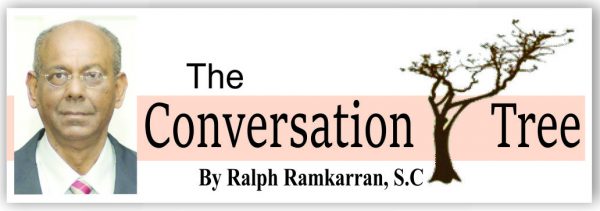 During last week, the Stabroek News published an article (Akola Thompson – “Towards a post-racial future” and a letter (Ryhaan Shah – “Little hope of a post-racial future for Guyana any time soon”) on the future of race in Guyana. Race is a difficult issue to discuss because of its complexity and intractability. But a peaceful and productive ethnic future for Guyana depends on how, and how urgently, we deal with the issue of race. Unless we do so soon, the sore of race in its several manifestations will continue to fester, producing infected material, draining the energy of Guyana into bad governance, marginaliation and discrimination, crime and corruption.
During last week, the Stabroek News published an article (Akola Thompson – “Towards a post-racial future” and a letter (Ryhaan Shah – “Little hope of a post-racial future for Guyana any time soon”) on the future of race in Guyana. Race is a difficult issue to discuss because of its complexity and intractability. But a peaceful and productive ethnic future for Guyana depends on how, and how urgently, we deal with the issue of race. Unless we do so soon, the sore of race in its several manifestations will continue to fester, producing infected material, draining the energy of Guyana into bad governance, marginaliation and discrimination, crime and corruption.
Ethnic hatred, born of prejudices developed over centuries, having their bases usually, but not always, in economic factors, is difficult to eradicate, even as conditions of discrimination are alleviated by laws and social measures, as experience in the US has shown. Guyana’s situation may not be unique. Trinidad developed in a similar manner. Both countries have two large ethnic minorities that make up the large majority of the population. But our politics developed differently. The Peoples’ National Movement traditionally had a significant enough Indo-Trinidadian vote that kept it in office for decades during the era of Eric Williams. After that coalition fractured, Trinidad maintained a sizeable floating vote, comprising all sections of the population, which resulted in periodic alternation between the parties, despite maintaining fairly rigid ethnic voting patterns and sensitivities.
In Guyana ethnic discord in politics developed against the background of two sets of circumstances in the period 1953-1955 and 1962-1964, both having their background in the Cold War. Political discord developed in the PPP after the 1953 suspension of the constitution leading to the split in 1955, which assumed ethnic manifestations with the formation of the PNC. The 1962-1964 era of ethnic violence and ethnic cleansing has left a legacy of ethnic bitterness across the ethnic divide. The alienation of Indian Guyanese between 1968 and 1985 and of African Guyanese between 1992 and 2015, have intensified Guyana’s ethnic burdens beyond that of Trinidad. Guyana is only now developing a voting group, still miniscule, that is not beholden to either major political party. Guyana’s ethnic groups still vote for their ethnic parties regardless of their performance in office.
Guyanese are well aware that the ethnic grip on politics creates political instability which, in turn, inhibits both local and foreign investment. Supporters of both parties tolerate corruption when their party is involved. The section of the population against the government cannot be encouraged to cooperate with the police in crime fighting. Unless there is broad political and civic agreement on the expenditure of the oil income, it will be dissipated and stolen as in so many other countries.
Shared governance had been formally advanced in Guyana by the PPP with its proposal for a National Patriotic Government in 1978. While it was rejected by the PNC, desperate economic circumstances forced talks between the PPP and PNC, initiated by the latter in 1985, but discontinued later that year by Desmond Hoyte after the PNC ‘won’ the elections. Cheddi Jagan promised shared governance in 1991 if the PPP won the 1992 elections. Desmond Hoyte accepted the principle of shared governance in 2001 after rejecting it, along with the PPP, in the constitution reform process in 1999-2000. In its 2015 manifesto, the APNU+AFC coalition promised shared governance.
Shared governance is not going to end racism, racial discrimination, or ethnic voting patterns, in Guyana. But it will reduce ethnic discord and discrimination, eliminate the politics of ethnic dominance, reduce the potential for corruption, and will go a long way in assisting to reduce crime. All round governance will improve dramatically. Guyana is in a good position to make this leap because there appears to be a broad consensus that this is the way forward.
APNU+AFC failed to uphold its promise of constitutional reform leading to shared governance. It is believed that when APNU realised that it is likely to hold a minority position in a government, based on its proposals, it reneged on its promise. It is clear that in Guyana Indians are not willing to be ruled by Africans and Africans are not prepared to be ruled by Indians. The answer is that the executive must consist of equal numbers from both major parties with the president alternating annually between the parties. The executive should have no place in the parliament which should comprise 50 members elected from constituencies and 15 top up members. A tie breaker in the executive can be a casting vote by the president, or by the parliament, or by a special majority in the parliament. If given to the president, it will mean that each party will have the casting vote in alternate years. In 1978, the PPP, under Cheddi Jagan, was prepared to accept a minority position in its National Front Government proposals. It should have no difficulty today of accepting a position of equality.
Shared governance will not happen unless public pressure is brought on the major political parties, as a first step, to include shared governance in their manifestos.





